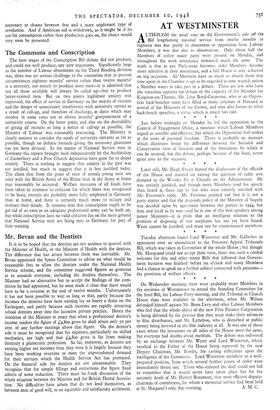The Commons and Conscription
The later stages of the Conscription Bill debate did not produce, and could not well produce, any new arguments. Significantly large as the number of Labour abstentions on the Third Reading division was, there was no serious challenge to the contention that in present circumstances eighteen months' service rather than twelve months' is a necessity, not merely to produce more men—it is admitted that not all those available will always be called up—but to produce better-trained men. But on two points legitimate anxiety was expressed, the effect of service in Germany on the morals of recruits and the danger of unnecessary interference with university entries as a result of call-up, and therefore of discharge, at dates which may involve in some cases ten or eleven months' postponement of a university course. On the latter point, and also on the desirability of giving all recruits as long a notice of call-up as possible, the Minister of Labour was reasonably reassuring. The Ministry is clearly anxious to consider the needs of university entrants as far as possible, though no definite formula giving the necessary guarantee has yet been devised. In the matter of National Service men in Germany the reports brought back independently by the Archbishop of Canterbury and a Free Church deputation have gone far to dispel anxiety. There is nothing to suggest that anxiety in the past' was not justified, but much to suggest that it is less justified today. The claim that from the point of view of morals young men are safer with the British Army of the Rhine than in the Army at home may reasonably be accepted. Welfare measures of all kinds have been taken in response to criticism for which there was recognised to be basis, recruits are probably more fully employed in Germany than at home, and there is certainly much more to occupy and instruct their minds. It remains true that conscription ought to be got rid of as soon as an adequate professional army can be built up, but while conscription lasts no valid criticism lies on the mere ground that National Service men are being sent to Germany for part of their training.














































 Previous page
Previous page